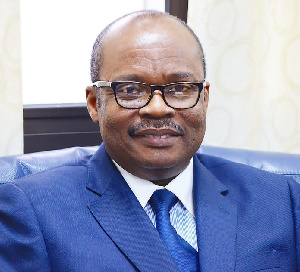 Dr. Ernest Addison, Governor Bank of Ghana
Dr. Ernest Addison, Governor Bank of Ghana
Governor of the central bank, Dr. Ernest Addison, has provided assurance to all stakeholders that his outfit will not sit down for the new Development Bank Ghana – which is set to be operational next month – to suffer the same ill-fate as previous ones did; saying this time, things will be different.
Concerns have been expressed by the public and specialist analysts questioning the rationale behind setting up a new development bank when existing ones such as the Agriculture Development Bank (ADB) and National Investment Bank (NIB) couldn’t live up to expectations. For example, the ADB was set up basically to provide agriculture financing, but the sector remains the most under-resourced in the country – making it unattractive for many to ply their trade there, and thereby dwindling its contribution to the economy.
And with the NIB, but for the fact that it was state-owned, it would have had its licence revoked like other local banks when the regulator cracked the whip on the sector in 2018. The bank is highly distressed and no longer able to support the industrial sector – the primary purpose for which it was formed.
But when journalists asked the Governor at his recent meeting with the press what the regulator will do differently this time to ensure the new development bank lives up to its core mandate of supporting the economy, Dr. Addison said there will be strict supervision of the bank, as is currently being done to the commercial banks.
“The bank was part of the team that drafted the supervisory and regulatory framework of the Development Bank of Ghana, and the Bank of Ghana was also very key in drafting that Act which has been passed by parliament for all development finance institutions. So yes, the central bank has a big role to play, because this is a bank that will be supervised consistently the way we supervise our commercial banks; and we will hold them to the same level of standards that we are holding the commercial banks to, in terms of corporate governance.
“Some of the cases that I have seen in the way these development banks work, before you can become a participating financial institution, you have to be cleared by the central bank. So, even in terms of the financial institutions that will be able to do business with the Development Bank of Ghana, these will be institutions that have been licenced by the Bank of Ghana; they will be institutions which have directors that are fit and proper. So yes, the regulator will be key in ensuring that things are done differently,” he said.
Government recently secured a €170million facility from the European Investment Bank for establishment of the Development Bank of Ghana (DBG), which forms part of measures to support businesses and bring the economy back to normality post COVID-19.
According to the Minister of Finance, Ken Ofori-Atta, DBG will help address two important constraints in the country’s financial system: namely, lack of long-term funding, and the lack of adequate funding to productive sectors of the economy.
The primary focus areas of DBG will be agribusiness, with a focus on off-farm value-chain activities, manufacturing, ICT, software; and allied services including Business-Process Outsourcing, tourism, and boosting home ownership through affordable and longer tenure mortgage finance
He added that the DBG will give neither retail nor direct business loans like the former Bank for Housing and Construction, NIB, ADB and the like. It will rather provide funds to the existing commercial banks and other qualifying financial institutions, to provide the long-term lending and other innovative products that are presently lacking in the system. The bank will therefore complement and strengthen the operations of existing financial institutions.
He further stated that the DBG will be established with an initial government equity contribution of US$250million, of which US$200million has already been paid. The World Bank is providing US$250million; KfW is providing €46.5million; and talks are ongoing with the African Development Bank (AfDB) to play a part in the bank’s establishment.
Government says it aims to increase DBG’s lending capacity by raising additional funds from domestic and international private and institutional investors.